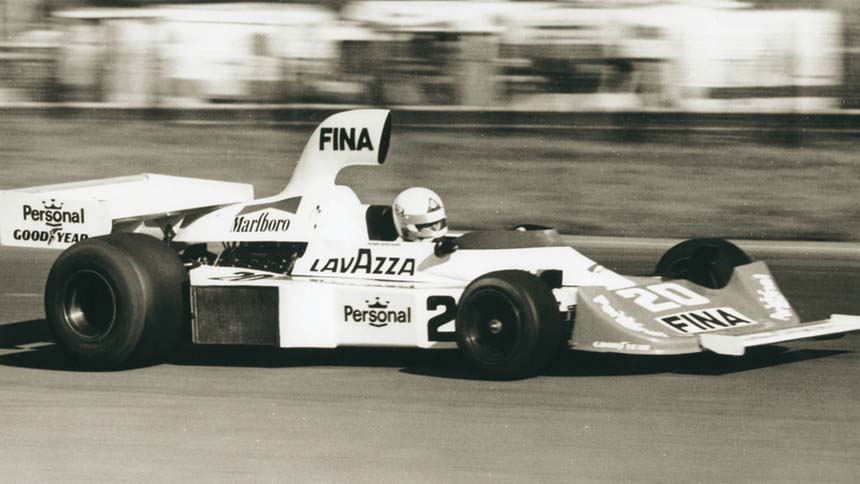He made a 46 years unbeaten record by winning the most World Championship of Drivers starting from 1951 and then 4 consecutive times from 1954 to 1957. With 24 wins, 29 highest pole positions, 35 podiums, 245 career points, and 23 fastest laps, he decorated his career with the greatest possible success. Jim Clark is undeniably one of the greatest and most dominant champions in F1 history, securing two titles in 1963 and 1965 and just missing out on the '62 World Championship due to an oil leak in the final race of the season. Clark has the fourth highest win percentage in history of 34.25%.
He also has an astonishing 33 pole positions from 72 starts. Famous for his formidable speed and partnership with Colin Chapman, Clark spent his entire F1 career driving for the Lotus team. Many fans and supporters alike believe the Scot would've added to his Championships if it wasn't for his fatal accident at an F2 race in Hockenheim in 1968. Clark still currently holds the record for the most career 'Grand Slams'.
The coolest character on the grid has always been Räikkönen's title, but he did also win the 2007 world drivers' championship by a single point over Hamilton and Alonso in one of the closest seasons of racing in Formula 1's history. Although he hasn't tasted title success since, he remains an F1 driver with Alfa Romeo and with a career stretching across 335 races – the most of any Formula 1 driver. Kimi has won 21 grands prix in his career, the last coming in the 2019 Italian Grand Prix during his final season at Ferrari. He attended the last race of his career in the 2012 Brazilian Grand Prix and finished in 14th place. He won 91 races in total in his successful career which includes most of the major championships with the fastest laps and highest pole positions along with 72 Grand Prix victories.
France's Alain Prost (No. 6) won a grand total of four championships in his career, tied for the third most ever. But from 1988 to 1991, he would claim only a single title, thanks largely to the otherworldly skills of Ayrton Senna (No. 1), his one-time McLaren teammate. Senna won more than 40 percent of the races he entered during that span, peaking with one of the highest Elo ratings ever in 1989. Even Prost's lone title in those seasons — in 1989 — was more about Senna's bad luck than Prost outracing him; although Prost beat his teammate only once all year in races they both finished, Senna suffered six retirements2 to Prost's three. Senna was so dominant that Prost ended up leaving McLaren for Ferrari in 1990; the rivalry would continue off and on for the next few seasons until Prost retired after his 1993 championship. Senna died the next year in a crash in the San Marino Grand Prix.
Prost was a once-in-a-generation driving talent, but he had the misfortune to race against Senna, a once-in-a-lifetime phenomenon. Surprise, surprise, look who it is! It's only the Greatest to ever do it! The original King of F1, the benchmark for all drivers. He's actually done it all and more, rewriting almost every record in the sport, holding the wins record for 19 years and record for most World Championships for 14 years. The only driver in history to top two decades, topping the 90's at 58 points to Häkkinen's 45, going on to dominate the first half of the 2000s topping the decade once again with an impressive 57 to Räikkönen's 47.
Growing up I wasn't the biggest fan of Michael, he was always winning and I supported the silver team, it was only once I grew up did I understand just how brilliant he was. Fast, strategic, reliable and adaptable he was undeniably in another league to anyone else on the grid and no matter what you think of him on track, off track he was the perfect gentleman. It was actually Ferrari and Schumacher's success that helped me appreciate the job Mercedes and Hamilton are doing currently.
His comeback from 2010 to 2012 is also included in his points tally taking his top ten finishes in the standings to an unprecedented 16 seasons , he is also the fourth most experienced driver of all time. Clark set 33 pole positions and won 25 of the 72 GP starts he made, and can claim numerous records to this day – in 1963, for example, he led 71 per cent of all laps raced that season. As well as his versatility, Clark was revered for his incredible silkiness behind the wheel, and his extraordinary mechanical sympathy.
"Jim Clark was everything I aspired to be, as a racing driver and as a man," his great friend Sir Jackie Stewart said. The most experienced pilot in F1 and it shows, competing in 18 seasons and showing no signs of slowing down, Kimi has made appearances in two top 10 decade lists . His experience and his drives for legendary teams McLaren, Ferrari and Lotus over the years have earned him such a high placing on this list, his consistency at the top for almost 2 decades is unrivalled. Winning the 2007 World Championship could've easily been his 3rd title triumph, narrowly missing out on the Championships with McLaren in 2003 and 2005 due to unreliability.
At the time of writing, Vettel has just ended his 6 year semi-successful stint at Ferrari, finishing runner up in the standings in both 2017 and 2018. Vettel has had a difficult time as of late, seemingly growing more unhappy at the Italian outfit over the recent years. From the 2021 season Vettel will be driving for the recently rebranded Aston Martin F1 team, you never know, he could still creep higher on the list... The first driver in the Top 10 is David Coulthard, who also happens to be the highest placed non-championship winning driver on this list.
The Scot finished third in the standings in 1995, 1997, 1998, 2000 and was runner up in 2001. Towards the tail end of his career he joined the brand new Red Bull racing team, taking the their first ever podium with an exquisite drive to 3rd in the 2006 Monaco Grand Prix. 18th is the 2009 World Champion. The Briton stayed for seven seasons taking 8 more wins in the process including McLarens last win at the Brazilian GP in 2012. He is the 5th most experienced driver of all time.
He began go-karting at aged 14, when he discovered the sport during a family holiday. His F1 career started at McLaren in 1980 with a disappointing campaign, but it kicked into life when he signed for Renault. He took his first few wins in 1981, and finished 4th in the drivers' championship in 1982.
But his career took a huge step in 1983, when he pushed Brabham's Nelson Piquet all the way and finished within two points of the title win. He made Mansell an offer he couldn't refuse, and boy was he glad he didn't. The 1992 seasons saw Mansell make the most scintillating starts to a campaign, with five straight victories in a row. He won three of the next five races, and dominated winning the championship by a huge margin over teammate Ricardo Patrese. He set his sights on America the following year, joining the IndyCar series, and won the championship. He was truly a vintage driver who got better with time.
And that's exactly what he did in 1975, with his first world championship. With an incredible Ferrari 312, he took the title with an impressive five wins. In '76, his rivalry with James Hunt came to the forefront. Lauda had another incredible start to the season with six wins and nine podiums in 10 races. But during the German Grand Prix, Lauda suffered life-threatening injuries that looked almost certain to end his life, let alone his racing career.
For a truly great rivalry requires drivers of broadly equal status. To cite Prost vs Senna again, they split the two championships they won when team mates at McLaren, and underpinning all the distrust and hatred was that respect for each other's abilities. That was laid bare by the thawing of relations that seemed to begin the moment they shared the podium in Prost's farewell race at Adelaide in 1993. The 1992 World Champion is next up, competing in 15 seasons between 1980 and 1995.
His story is one of my favourites, one of patience, determination and heart break. I'd personally love to see a movie made on his career. Mansell excelled in arguably the most competitive era of F1; fighting his way to the top of the mountain and driving some of the greatest races ever... (Silverstone '87 anyone) He also drove for four of the most legendary teams in the sport; Lotus, Williams, Ferrari and McLaren. Mansell ranks 7th on the all-time wins list. Alonso is known for his tactical literacy and pure speed.
He won two titles with Renault in 2005 and 2006, and has raced for the biggest names in the sport, from Ferrari to McLaren. Whilst Alonso failed in his bid to become a three-time champion, he remains one of the most respected drivers on the grid, now driving for Alpine and his flexibility to jump in a car and compete at the top remains unparalleled. Schumacher is often considered the GOAT.
Schumacher remains popular, even among those who do not follow motorsport and it's obvious why. Seven championship titles, 91 victories, 68 pole positions… he broke almost every record in the book during his time in Formula 1. He retired in 2006, only to return with Mercedes in 2010 before again retiring in 2012. Schumacher the suffered a serious head injury from a skiing accident in December 2013 and his condition remains unknown to this day.
Formula One is the highest class of open-wheeled motor racing defined by the Fédération Internationale de l'Automobile , motorsport's world governing body. The "formula" in the name refers to a set of rules to which all participants and cars must conform. The F1 World Championship season consists of a series of races, known as Grands Prix, held usually on purpose-built circuits, and in a few cases on closed city streets.
Each winner is presented with a trophy and the results of each race are combined to determine two annual Championships, one for drivers and one for constructors. The World Championship for Drivers is held since 1950, after the Formula One standard was agreed upon in 1946. The Constructors' Championship was added for the 1958 season and has been awarded ever since.
Not all of the world's great sporting stars are as extrovert as they might appear – or as we might want them to be. Jim Clark was one of the most unassuming men ever to sit in an F1 cockpit, but also arguably the most singularly gifted driver of all time. Perhaps not the most "raw talented" driver of all time but his intellect,determination, technical understanding and and smooth driving style could have won him 2 or 3 more titles. He did not always pick the best teams after leaving Ferrari after 77. Schumacher, Prost, Vettel always drove in first rate winning cars, Lauda did not. This superstar has collected over 3000 career points combined with 151 podium places.
This man holds the record for the highest number of pole positions, podium finishes and career victories. Like several other FiveThirtyEight Elo systems, the average driver has an Elo score around 1500, while new drivers start with 1300 points. The "K-factors" in this version of Elo — which are multipliers that determine the sensitivity and fluctuation of a driver's rating — are more extreme in the beginning of a driver's career. Drivers start with a K-factor of 24 for approximately the first year, then reduce as they gain experience. Qualifying results are predictive of race results, which makes sense considering that qualifying results both set the starting grid for the following race and allow for drivers to demonstrate their raw speed and talent on a level field. The minimum K-factor for qualifying sessions is 16, while the minimum K-factor for races is 12.
Drivers always gain Elo points after "defeating" another driver and lose ground after "losing" to them. Friends away from the track, Niki Lauda (No. 8) and James Hunt (No. 17) had a fierce rivalry behind the wheel that peaked during the 1976 season. Lauda went into the year as F1's top-rated driver by Elo before suffering a fiery crash at the German Grand Prix that nearly took his life. Six weeks after being given last rites, Lauda somehow bounced back to finish fourth at the Italian Grand Prix. But in the end, Hunt ended up eking out the 1976 title by a single point over his Austrian rival. Hunt was quick again the following season, but he was unable to keep his car on the track; he took six poles to Lauda's two but retired from eight of 17 races, six of which were due to mechanical failure.
Lauda took advantage, claiming his second title in three years. Gerhard Berger is a driver whose stats don't jump out at you at first but he's a lot more than meets the eye. Berger drove for some of the best teams in F1 in arguably its most competitive era.
Most Successful Driver In Formula 1 History Berger is known for having very strong team mates, including Nigel Mansell at Ferrari and Ayrton Senna. He replaced Prost at McLaren after he left for Ferrari, he then briefly returned to Ferrari and then left for Benneton where he made way for Michael Schumacher. The 1970's was the closest decade in terms of points and also with the lowest points average. Lauda ended the decade as the second most successful driver on 43 points, just one point behind Fittipaldi and level on points with Scheckter and Regazzoni.
The early story of Niki Lauda is similar to the one of Nelson Piquet, also coming from a family who strongly disapproved of his racing ambitions, Lauda famously took out a £30,000 bank loan to buy a seat with the March team in F2. Perhaps the greatest story of all though was his comeback after his horrific accident at the 1976 German GP at the Nurburgring. Remarkably only missing two races and getting back into the seat just six weeks later, Lauda missed out on the title to James Hunt by just a singular point. Nelson Piquet's story is one of great interest and a story of dedication. Originally a tennis phenomenon, the Brazilian was a regional champion and one of Brazil's most exciting prospects before his focus switched to Go Karting. Racing under an altered version of his mother's surname to hide his new found love from his disapproving parents, even winning Karting and Sportscar championships wasn't enough to win his parents over.
Piquet is the second most successful driver of the 1980's. Stirling Moss is often remembered as the greatest driver to have never won a World title, finishing runner up 4 years on the trot from 1955 to 1958 and finishing in the top 3 in 1959, 1960 and 1961 respectively. Amazingly, Moss has an F1 racing record of 35 retirements (52.2%) during his F1 career which still landed him comfortably in the top 20 greatest drivers ever, a testament to his ability in the car. Although this list is based on F1 performances alone it must be mentioned that Moss raced from 1948 to 1962 in plenty of different categories and won 212 of the 529 races he entered. Lauda may not have the most titles, wins or poles, but the Austrian cannot be left of such a list. He was the leading driver of 1974 Ferrari team and won his first world title in 1975.
In 1976, however, his progress was interrupted by a crash at the infamous Nürburgring. Nikki suffered horrible burns to his body, head, throat and lungs. But surprisingly, after only two and a half months in hospital, he was driving again, fighting for the 1976 world title which he was in contention for until the final race of the season in Japan, losing out to James Hunt by only one point. To prove his worth, he returned in 1977 to win his second title before retiring in 1979. Senna is perhaps considered by some the second best driver after Schumacher. Senna won the Formula 1 drivers' championship titles in 1988, 1990 and 1991.
The Brazilian was known for his spectacular driving and propensity to take risks. Ayrton had the reputation of being one of the best drivers who managed to master the car in the most adverse weather conditions and for this skill, he was given the nickname "Rain Man". Senna suffered a fatal accident during the 1994 San Marino Grand Prix robbing the sport of a multiple world champion in the prime of his career. He is the only driver in F1 history who finished in 1st position in 5 consecutive seasons from 2000 to 2004 Grand Prix.
He won his last race in the 2006 Chinese Grand Prix. During 2007 & 2008, he worked as the brand ambassador and car developer of Ferrari. He made his career quite successful with a total of 16 Grand Prix wins, 16 pole points, 24 podiums, and 186 career points. Unfortunately, this great racer had no world championship record.
Later, he also won Formula One World Drivers' Championship four consecutive times from 2010 to 2013. Till now, he has achieved 39 wins in GP, 45 pole positions, and 1549 career points in total. That opened the door for Hamilton's dominance to flourish. He's won every title since, has become the only driver to record over 100 pole positions, and is nearing the same triple-figure feat in race wins. Obviously many voters are too young. He was the best F1 driver of the 80s and easily top 5 of all time.














































